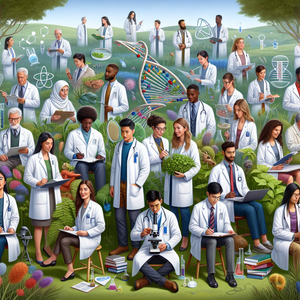
Exploring Career Paths for Biology Graduates: A Journey Through Diverse Opportunities
For graduates of biology, a world of career possibilities awaits, stretching across multiple sectors such as healthcare, research, education, and environmental conservation. The adaptability of a biology degree not only nurtures scientific curiosity but also opens doors to a variety of professions like medical scientists, biostatisticians, and wildlife conservationists. In today’s dynamic job market, it is crucial to comprehend the roles available, along with the necessary qualifications, salary expectations, and overall job satisfaction. This article delves into the rich tapestry of career opportunities for biology graduates, supported by current statistics on employment trends and salary ranges, while encouraging readers to reflect on their unique interests and skills.
Job Summaries:
Medical Scientist:
- Medical scientists are at the forefront of health advancements.
- They conduct laboratory tests and clinical trials to develop new treatments.
- They work closely with healthcare professionals.
- They often hold a Ph.D. in a relevant discipline.
Genetic Counselor:
- In the evolving field of personalized medicine, genetic counselors assess patients' risks for inherited conditions, offering crucial support and information.
- These professionals typically require a master’s degree in genetic counseling.
Clinical Research Coordinator:
- Clinical research coordinators oversee clinical trials.
- Ensuring compliance with regulations.
- Managing day-to-day operations.
- A background in biology or a related field is essential.
- Strong organizational skills are important.
Biostatistician:
- In public health, biostatisticians analyze data from biological studies.
- Utilizing strong analytical skills to inform health policies.
- A master’s degree in biostatistics is typically necessary.
Bioinformatics Specialist:
- As the intersection of biology and technology grows, bioinformatics specialists analyze biological data using computational tools.
- A degree in bioinformatics or a related field is often required.
Nature Conservation Officer:
- Nature conservation officers play a key role in protecting natural resources and ecosystems.
- With a degree in biology, ecology, or environmental science, they conduct field surveys and develop conservation strategies.
Marine Biologist:
- Focusing on ocean ecosystems
- Marine biologists conduct research to address pressing environmental issues such as pollution
- A degree in marine biology or a related field is generally required.
Wildlife Biologist:
- Wildlife biologists study animal populations and their habitats.
- They collaborate with various agencies to create effective conservation strategies.
- A degree in wildlife biology is necessary for these roles.
Forensic Scientist:
- Forensic scientists employ biological techniques to analyze evidence from crime scenes.
- They contribute significantly to criminal investigations.
- A degree in biology or forensic science is typically required.
Pharmaceutical Sales Representative:
- In the commercial realm, pharmaceutical sales representatives leverage their knowledge of biology to promote medications to healthcare professionals.
Science Writer:
- Science writers help bridge the gap between complex scientific concepts and the general public.
- With a background in biology and strong writing skills, they create engaging articles and reports.
The array of career paths available to biology graduates highlights the field’s vastness and its vital contributions to science, health, and environmental stewardship. Each profession offers unique challenges and rewards, underscoring the importance of self-reflection for aspiring professionals.
Explore More Jobs

